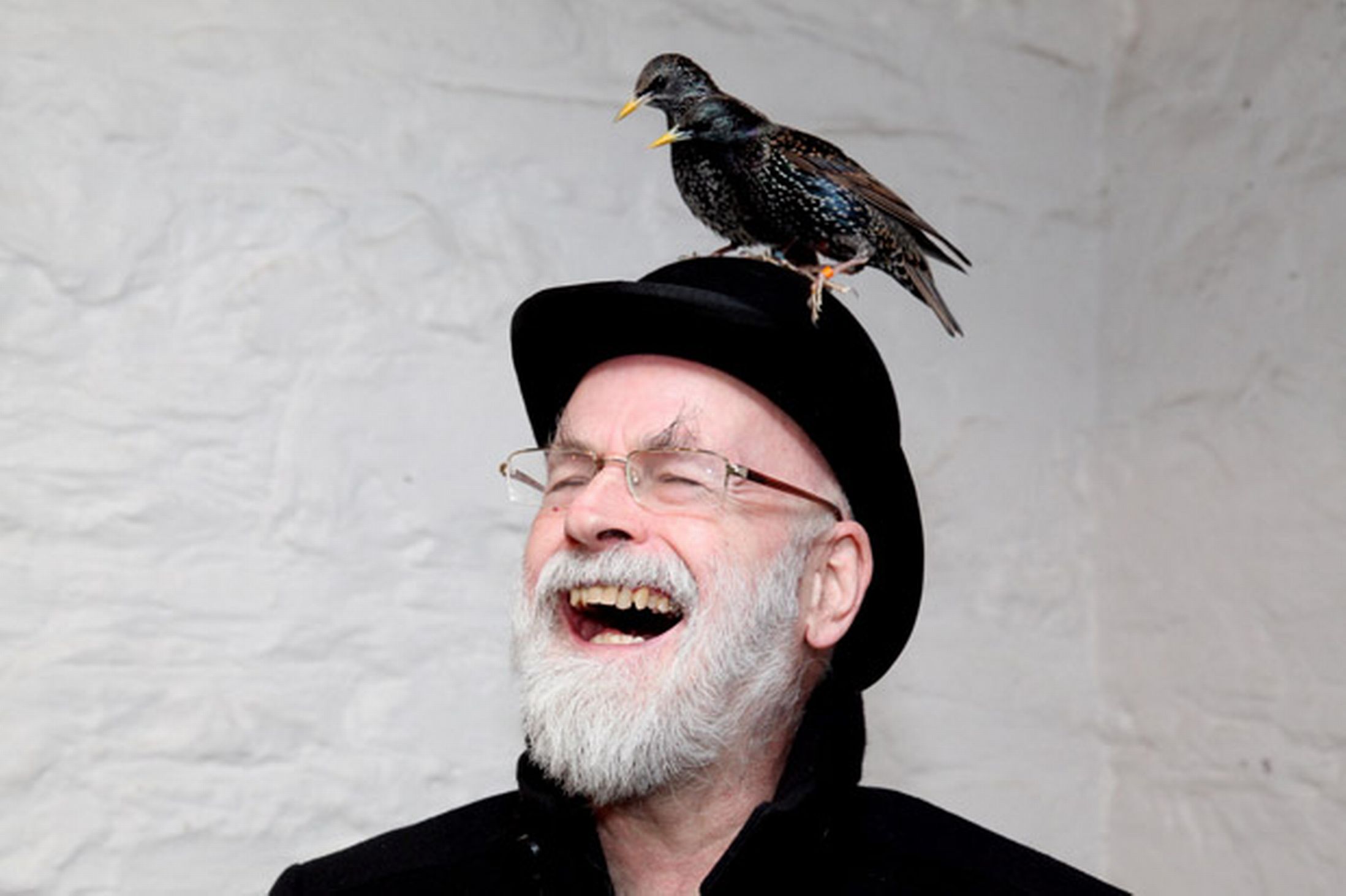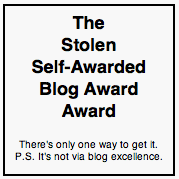I hope that, by now, everyone knows that the beloved Sir Terry Pratchett died recently. I hope that people know that, because for a few days after I found out (which was pretty much as soon as the articles started going up, I think), I kept accidentally being the bearer of horribly depressing news when I went to talk to people about my feelings. And then I’d get a rather odd look from my fellow Discworld “fan” who has no idea why, when they compliment my Discworld shirt, I respond with immense sadness. (I put “fan” in quotation marks because, I mean, I feel like fans would know.)

I’ve never lost an author before. I mean, I’ve read books by dead people, of course. And I’m sure authors I’ve read books by have died in my lifetime since my reading of their books. I don’t really know. Or if I do, it’s something I find out much later, and say, oh, well, that’s unfortunate, she was good. And, to be completely honest, I’ve never quite understood the hysteria surrounding the death of a famous person. Please don’t leave angry comments, but: When Robin Williams died last year, and everyone I know began acting like he was their favorite actor to ever have existed when I know for a fact that a few weeks ago they had said something about how he’s not all that funny anymore, and suddenly they’re in full mourning–well, I grew up listening to the Evita soundtrack, and there’s a certain song that gets stuck in my head. Please know that I’m not saying that Robin Williams’ death wasn’t horrible or sad. He suffered from terrible illnesses and I really do hope that whatever happens after we die, he’s found peace. I do. But I didn’t feel it personally, and I had a hard time believing that all the hysterical mourners on my Facebook wall did, either. But after losing Sir Terry, I think I get it a bit more.
I think the first time I ever saw a Discworld book, I was in middle school and some girls I knew loved them. They were geeks, so I kind of wrote them off as books for geeks, completely ignoring that I could basically recite from memory every Harry Potter book. I came across them again in high school, again in the hands of geeks (different geeks, since it was a different school), but suddenly I had found that these geeks were my close friends, and oh, wow, I’m a geek, too! So they started lending me their books. I read a few and, honestly, I wasn’t thrilled with them. I didn’t dislike them, though, so they lent me more. I soon realized that I wasn’t all that into Rincewind (and, well, Sir Terry himself never recommended starting with A Color of Magic and The Light Fantastic, so maybe that’s not my fault), but I really liked the others. I read Eric, The Wee Free Men, Small Gods, and a couple of others, and I soon found that my worldview had changed completely. I wasn’t brought up with religion, but the way things worked in Small Gods made a whole lot of sense to me, and I still look at theology through that lens. Still, though, I wasn’t what you’d call a Discworld Fan. I had read a few of the books and mostly liked them. I borrowed a copy of Good Omens from a teacher who then got fired so I never had to give it back. It’s still on my shelf.
It wasn’t until college that someone gave me the right Discworld books, that I read about Sam Vimes and Granny Weatherwax and Moist von Lipwig, and I realized I’d been going about it all wrong. My copies of the City Watch books are almost as beat up as that copy of Good Omens, I’ve read them so many times. The pages are dog-eared so I can always find the funniest bits, though when I lend them to people they always kindly unfold the pages for me because they know that, as a book lover, I must hate it when pages get like that. (In a $30 hardcover? Yes. In a $7.99 paperback with frayed corners and 12 cracks in the spine that I’ll have to replace with the new taller edition anyway so the shelf lines up right? No.) I devoured the first two books in the Long Earth series, and finishing the rest, well, I’ve got a 2’4″ stack of books I have to make some headway on before I can buy anything else, but I can’t wait to get to it.
So even though I’ve never returned to the Rincewind books–until tomorrow, that is, when I will finish the book that I’m reading (A Slip of the Keyboard, Pratchett’s collected nonfiction, because how could I have picked up anything else?) and pick up The Color of Magic again, this time as an actual Discworld Fan–Pratchett’s work has been a huge influence on my life. Half my thoughts about life are in the form of sarcastic footnotes. The City Watch series is something I’ve been able to share with Mike, who better hurry up and read Night Watch and then Thud! because those two are my favorites, and I love being able to share books with someone and laughing hysterically at 1:30 in the morning at the suggestion of naming a future potential child we may have Dorfl.

Reading A Slip of the Keyboard is eye-opening in a way that feels similar to how I felt when Small Gods made so much sense to me eleven years ago. I want to write, and I’m realizing that I’m going about it all wrong. I’m reading all the wrong things, and, well, I’m not going to stop reading the things that I love, but there’s a lot of stuff out there aside from science fiction and fantasy, a lot of nonfiction, classics, mythology, science, whatever, that could inform me as a theoretical writer much more than just reading the types of books I want to write. You don’t bury an apple tree to grow an apple tree.
So thank you, Sir Terry, for all that you’ve given to me and the world. I cried a whole lot (awkwardly, at work, but fortunately with a boss who also loves him and understood), but I realize now that you also helped to create in me the mechanisms necessary to deal with this. You taught me that “a man’s not dead while his name’s still spoken,” and that DEATH is actually not too bad a guy, and maybe this is heaven and when we die we’re actually being born, and that after you die, you’ll end up wherever you believe you’ll end up. And I’m hoping that you’ve ended up on the Discworld, and that if you have, it’s somewhere that can offer you Truth, Justice, Freedom, Reasonably-Priced Love, and a Hard Boiled Egg.
All the little angels rise up, rise up,
All the little angels rise up high!
How do they rise up, rise up, rise up?
How do they rise up, rise up high?
They rise heads up, heads up, heads up,
They rise heads up, heads up high!

(If you’re just here for my update on my Read Harder challenge, I’m not remotely sorry about all that. But the other part’s starting now.)
In the winter, I like to read fairy tales. Not necessarily classic fairy tales, but books that make me feel the way I imagine Lucy first felt when she stepped through the back of that wardrobe into a snowy Narnia with a lamp post sprouting out of the ground in front of her. I think I’ve inextricably linked that scene and snowstorms in my mind, which is why I always feel like something magical is going on when it starts to snow, while real adults just sit and complain about the shoveling. (At a certain point every winter, though, I’m over it. It’s pretty, but it can go to Hell.) It’s for this reason that I decided my second Read Harder Challenge book should be a retelling. There are so many retellings with so much magic in them, I knew I’d find the perfect one. So one kind of dismal and slow day at work, as I walked around neatening up shelves, I pulled a few off and read the backs, hoping to find the perfect fairy tale retelling to fulfill this slot on the challenge. And then something jumped out at me. Something I’d bought ages (okay, months) ago and had sitting on my TBR shelf at home just waiting for me. Something I’d been meaning to read since I did an independent study in epics back in college. The Penelopiad by Margaret Atwood.
Not a fairy tale. Not what I was looking for or expecting to want to read. But the perfect book nonetheless.
When I say I did an independent study in epics, what I mean is that in the course of three months, I read The Odyssey and two modern epics that are heavily based on it, one of which was Ulysses, and guys, if you ever want to hate yourselves, design an independent study that you need a good grade in to graduate that requires that you read Ulysses in a month. And understand it. I guarantee you’ll never want to look at the book again. That’s besides the point, though.
At some point, something happened, some discussion occurred, and my professor recommended The Penelopiad to me. I hadn’t read Atwood at that point, so while I vaguely remembered the title, I wasn’t about to rush to the store to get yet another book based on The Odyssey. I’d had quite enough, thank you. But I’m pretty sure the discussion that led to this recommendation was about the maids. I’m pretty sure I didn’t like their death. So now, all these years later, I’m happy to say that Margaret Atwood didn’t like it, either.
The Penelopiad is a slim volume where Penelope recounts her experiences while her husband was on his famed Odyssey from a safe distance of a few thousand years, which she’s spent mostly in the sort of afterlife she believed in. The book was surprisingly straightforward. Penelope’s been planning this story for thousands of years; she’s not about to waste her time making things convoluted for us. She has something to say, and she’s finally ready to say it, and what it is is her story. Her side of the events. What she was doing the whole time he was gone. How she ran the household, built it up, tricked people who needed tricking, raised a frankly thankless son, kept an eye on the suitors while keeping them at bay, and how she lost everything for it. How the suitors took most of what she had, and when Odysseus returned, he took the rest, her twelve favorite maids who acted under her orders and were loyal to her throughout. All for the crime of having been raped.
The maids get their say, too, though not in the way you might expect. They’re the Chorus. They appear between chapters and sing a song, or tell a story, or, in one instance, give a university lecture on their significance to the story of The Odyssey.
If you’ve ever read The Odyssey and you’ve ever got a little free time, this book is worth picking up. It’ll present some new ideas, and those ideas that aren’t new will be put under a different light. Atwood doesn’t make much up, really; she tells the story so obviously lurking in the background of the classic–so obviously that most of us never really even notice it.


 Anyway, I realize I have gotten horribly sidetracked by my feeling that I have been personally insulted when someone thinks good ol’ JK is a bad writer. That really wasn’t my point.
Anyway, I realize I have gotten horribly sidetracked by my feeling that I have been personally insulted when someone thinks good ol’ JK is a bad writer. That really wasn’t my point. And while it’s kind of funny, it’s not accurate. Saving Buckbeak didn’t reawaken the dead. You think you hear Buckbeak dying, but once they go back with the Time Turner, you see what was actually happening. Buckbeak never died to begin with. In fact, if they hadn’t used the Time Turner to go back and save Buckbeak, that would have been changing the past, because they had already done it. It follows the rules. Lily and James, on the other hand, actually did die. They couldn’t do anything about it. And why would they? It’s awful, but their deaths brought about the boy who would ultimately defeat Voldemort. If they hadn’t died, Voldemort could have reigned forever. Does that sound like a good plan to you? But, yes, other books have good world building in them.
And while it’s kind of funny, it’s not accurate. Saving Buckbeak didn’t reawaken the dead. You think you hear Buckbeak dying, but once they go back with the Time Turner, you see what was actually happening. Buckbeak never died to begin with. In fact, if they hadn’t used the Time Turner to go back and save Buckbeak, that would have been changing the past, because they had already done it. It follows the rules. Lily and James, on the other hand, actually did die. They couldn’t do anything about it. And why would they? It’s awful, but their deaths brought about the boy who would ultimately defeat Voldemort. If they hadn’t died, Voldemort could have reigned forever. Does that sound like a good plan to you? But, yes, other books have good world building in them.
